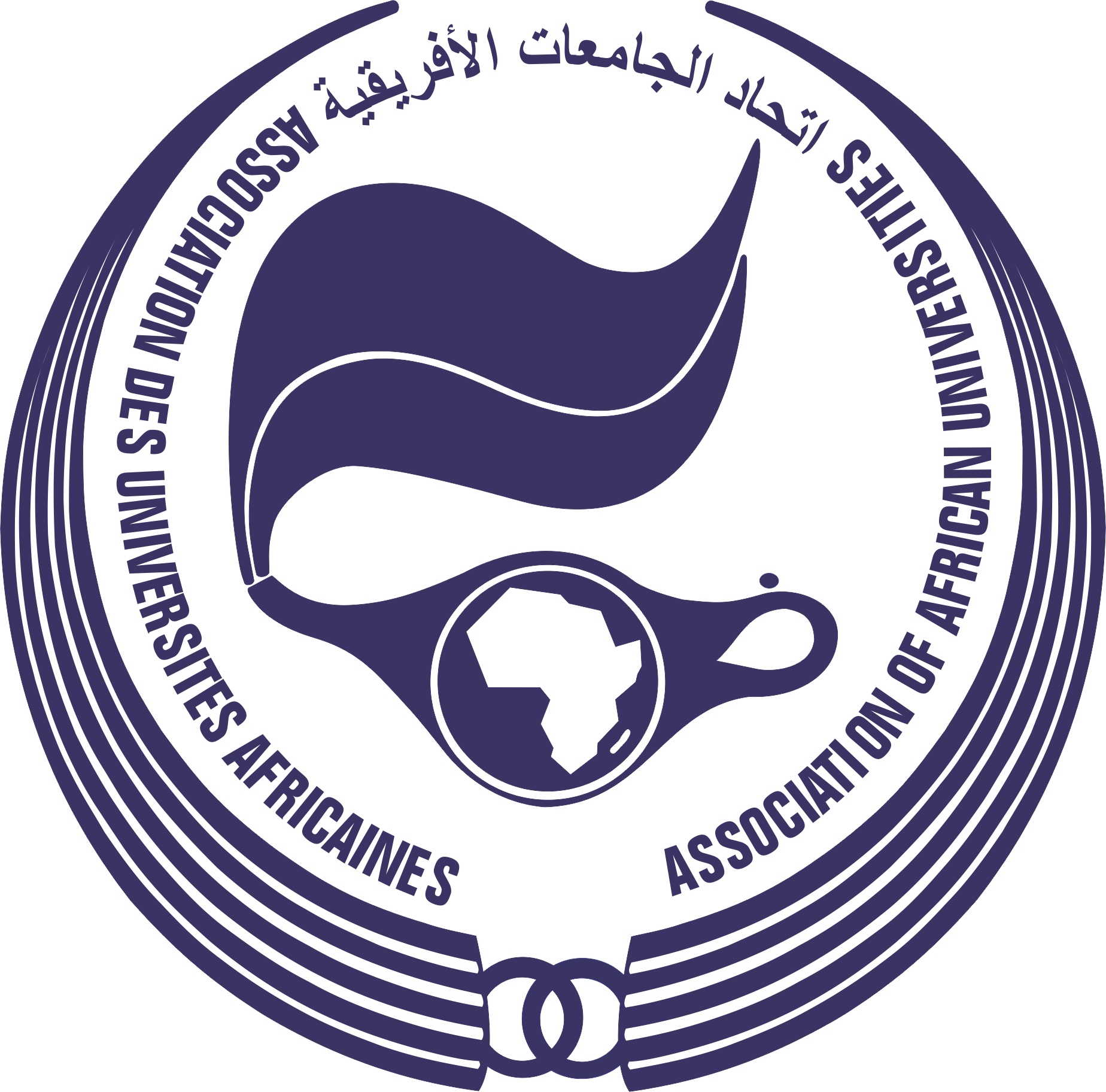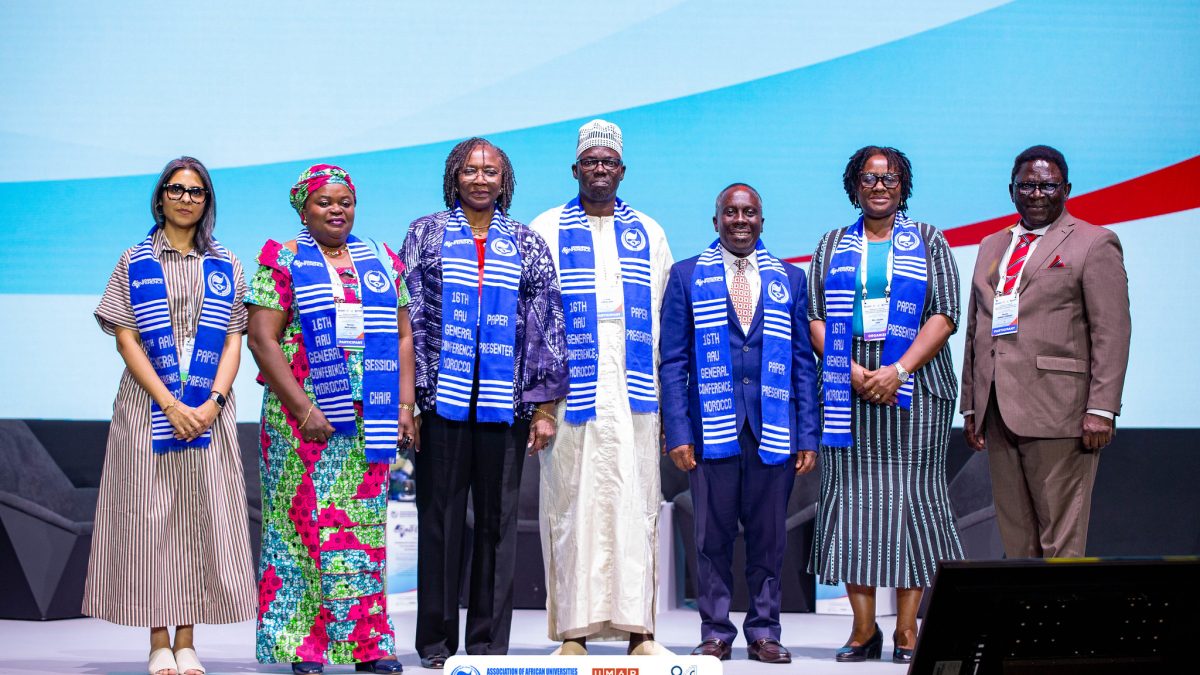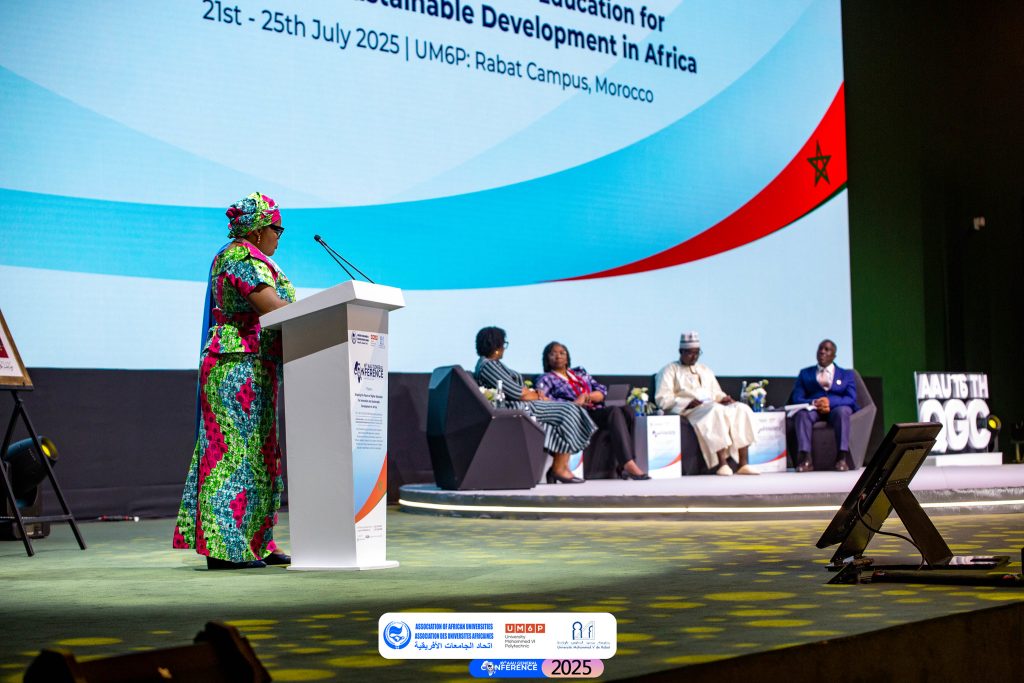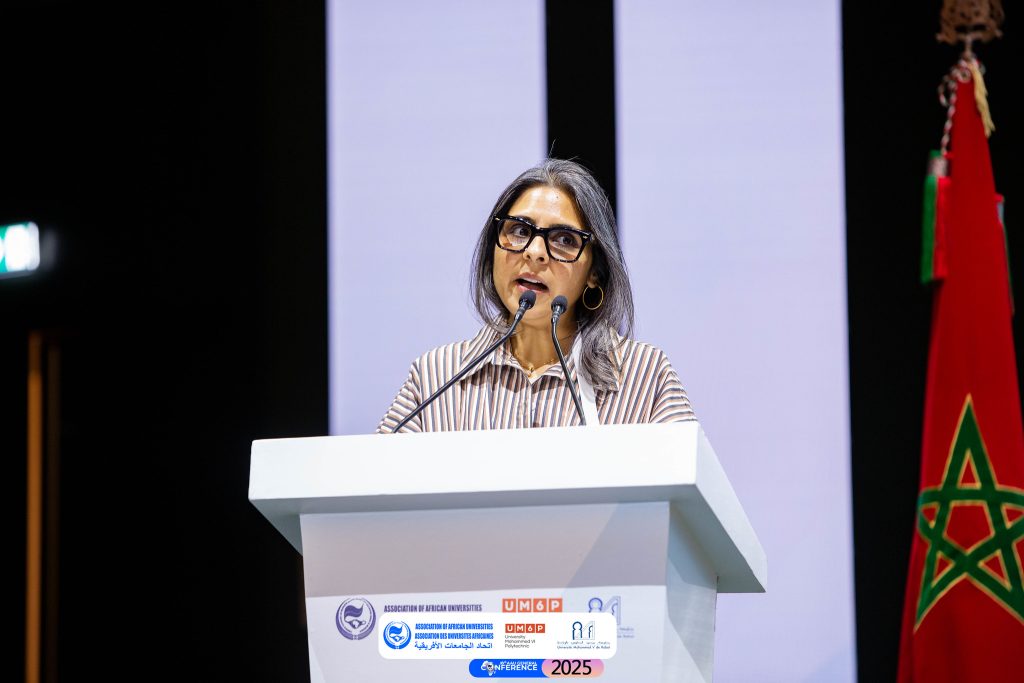
Forger des Synergies Stratégiques : le Dialogue de Bogota comme Catalyseur pour la Collaboration Interrégionale dans l’Enseignement Supérieur
July 23, 2025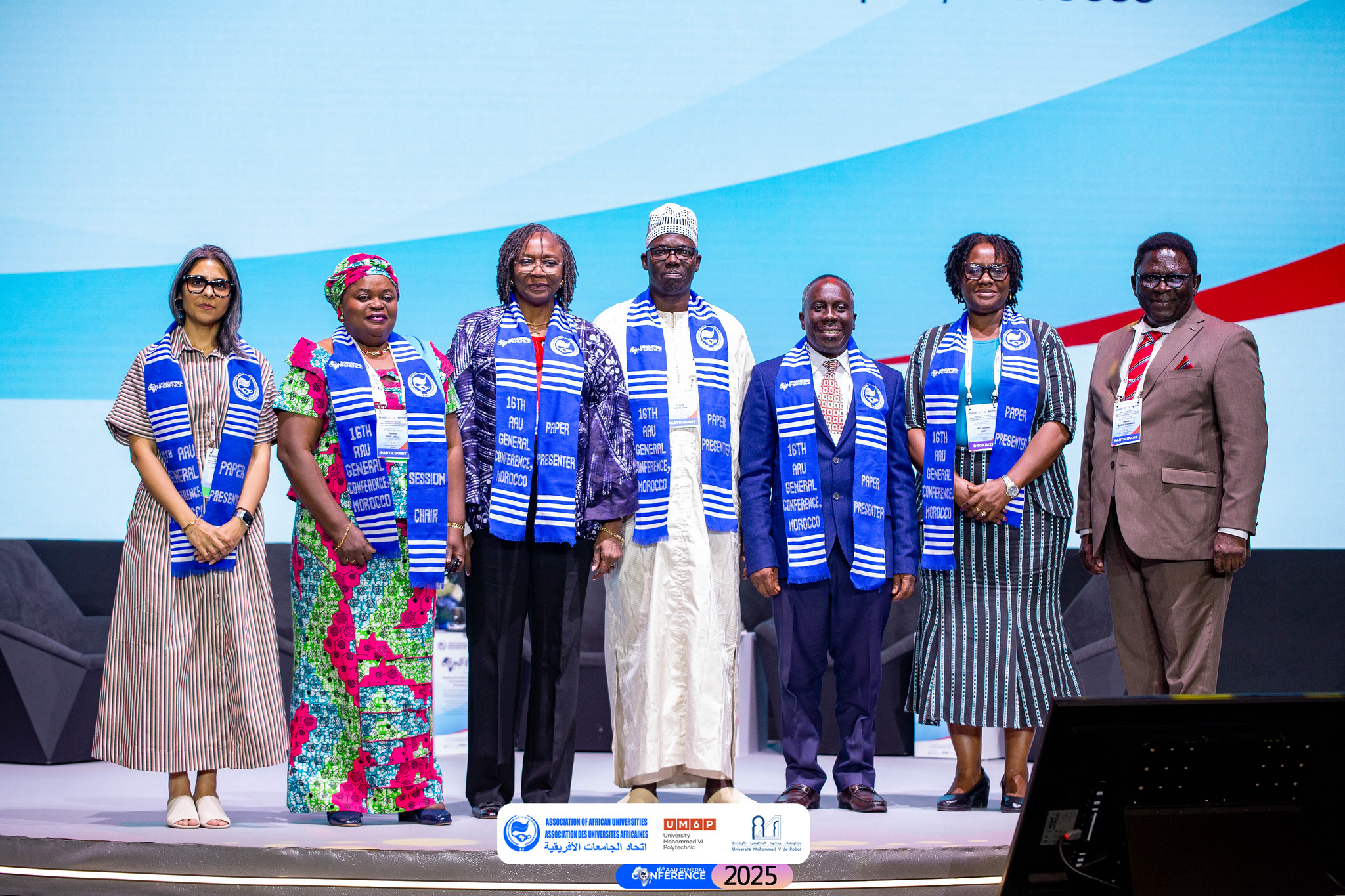
Renforcer l’enseignement supérieur en Afrique par des initiatives d’impact : l’apport transformateur du Programme des Centres d’Excellence de l’Enseignement Supérieur (CEA)
July 23, 2025From 21st–25th July 2025, the city of Rabat, Morocco, became a hub of vision, dialogue, and collaboration as the Association of African Universities (AAU) convened its 16th Quadrennial General Conference. Held under the inspiring theme “Shaping the Future of Higher Education for Innovation and Sustainable Development in Africa,” the conference brought together a diverse community of educators, researchers, development partners, and policymakers committed to strengthening higher education across the continent.
Among the most impactful moments of the conference was a high-level panel session that examined initiatives reshaping African higher education, with a particular focus on the Africa Higher Education Centres of Excellence (ACE) program – a transformative, multi-phase initiative that has elevated the quality and relevance of postgraduate education in Sub-Saharan Africa. The session, chaired by Prof. Theresia Kimbeng Nkuo-Akenji (AAU Vice-President for Central Africa and Vice Chancellor of the University of Bamenda), featured prominent panelists who shared insights on the program’s progress, achievements, and strategic direction. These included Prof. Folasade Ogunsola, Vice Chancellor of the University of Lagos, Nigeria; Prof. El Hadji Bamba Diaw, Director General of 2iE, Burkina Faso; and Prof. Richard Buamah, Centre Leader of RWESCK, Ghana. University of Lagos and 2iE both hosts Centres of Excellence. The panelists reflected on key lessons learned over the past decade and explored forward-looking plans to sustain and expand the impact of the ACE program across the continent.
From Gaps to Gains: The ACE Program’s Transformational Journey
Africa’s higher education system has long faced significant hurdles: limited postgraduate output, underfunded institutions, insufficient alignment with labor market needs, and poor research infrastructure. In response, the ACE program was launched in 2014, with $657 million from the World Bank and €72 million from the French Development Agency (AFD) in funding support.
With a results-based financing model, the Africa Higher Education Centres of Excellence (ACE) program has redefined higher education financing in Africa, ensuring that investments translate into tangible improvements in academic quality, research output, and regional collaboration. Today, ACE stands as one of the continent’s most ambitious and impactful higher education initiatives.
Mrs. Adeline Addy, Monitoring and Evaluation Manager at the AAU, highlighted the program’s evolution through its three phases—ACE I, ACE II, and ACE Impact—and its establishment of over 80 centers in 20 countries across sub-Saharan Africa, focusing on ten priority sectors including health, agriculture, energy, ICT and digital development, water and sanitation, and education.
Over the decade, the program has made remarkable strides in advancing the quantity, quality, and access to postgraduate education while addressing regional development challenges in the continent. Some key achievements include:
- Over 90,000 master’s and PhD students enrolled, with more than 30% being women
- Over 400 national and international program accreditations obtained
- More than 10,000 research publications, a third of which were co-authored by researchers across borders, demonstrating strong regional collaboration
Beyond enrollment and research outputs, the ACE program has catalyzed systemic improvements. It has supported the creation and enhancement of Technology Transfer Offices (TTOs), translating academic research into real-world innovations. It has also invested in modern laboratories and learning environments, giving African researchers access to the infrastructure needed for advanced scientific discovery. For instance, ACEGID’s acquisition of the Illumina NovaSeq™ X Plus sequencer marks a significant milestone, as it is the first of its kind in the region with the advanced capability to sequence an entire human genome, opening new frontiers for genomic research and precision medicine in Africa.
At the country level, the ACE program has set a commendable precedent worth emulating. Its proven success under a results-based financing model has demonstrated tangible improvements in accountability, transparency, and performance. Notably, Nigeria has taken bold steps by establishing its own government-supported Centers of Excellence and adopting the ACE model as a framework to strengthen oversight and accelerate impactful outcomes within its higher education sector.
As the project officially concluded in June 2025, ensuring the sustainability and expansion of its gains has become a key priority. This was further underscored by Namrata Tognata, Senior Education Specialist and ACE Task Team Leader at the World Bank, during her presentation at the conference. She emphasized the importance of deeper institutional integration to ensure long-term impact, calling on universities to play a stronger role in human resource management, governance, financing, and research leadership. She outlined the Bank’s forward-looking vision for regional higher education, which includes continued support for competitive selection, priority sector alignment, and outcomes-based financing. Namrata also advocated for embedding structures like innovation hubs and technology transfer units within universities to strengthen academic ecosystems and national development. Additionally, she highlighted the need to expand collaboration through national consortia and pan African platforms. While acknowledging the program’s significant successes, she stressed the importance of tailored support for centers in areas requiring improvement— such as commercialization, innovation, and industry engagement. She concluded by reaffirming the value of third-party result verification, ongoing operational support, and strategic partnerships as critical levers for sustaining and scaling the ACE model across the continent.
Looking Ahead: Challenges and Shared Commitments
Despite the progress achieved, challenges persist, including language barriers that hinder regional mobility, policy misalignment that complicates industry partnerships, and funding gaps that threaten sustainability. The vital role of governments’ support in addressing these bottlenecks and the need for enabling policy frameworks that allow institutions to innovate, collaborate, and grow was underscored.
There was also a resounding call for greater continental solidarity. By fostering collaboration between universities and aligning efforts across countries, Africa can better position itself as a global leader in knowledge production and innovation
A Shared Vision for the Future
The transformative impact of the Africa Centers of Excellence (ACE) program clearly demonstrates the remarkable progress that can be achieved when investment in higher education is prioritized and strategically aligned with development needs. The ACE Programme has been a transformative force across the continent – training Africans in Africa to solve Africa’s most pressing challenges problems.
About the ACE Program
Africa Higher Education Centers of Excellence (ACE) is a World Bank funded program, in collaboration with the governments of participating countries to support African higher education institutions to specialize in strategic thematic areas to promote sustainable growth and development in Africa.
Initiated by World Bank, the first phase of the ACE program (ACE I) was launched in 2014 with 22 centers in nine West and Central African countries while the second phase (ACE II) in 2016 with 24 centers in East and Southern Africa. These two initial phases of the ACE program succeeded in building and strengthening the capacities of African higher education institutions to deliver high-quality training and applied research and enhance the skills demanded for Africa’s development.
Based on these successes, the World Bank, together with AFD, launched the Africa Higher Education Centres of Excellence for Development Impact (ACE Impact) project in 2019 with 54 centers in 35 universities and 10 West African countries as well as Djibouti to further strengthen post-graduate training and applied research in existing fields and support new fields that are essential for Africa’s economic growth.
Under the ACE Impact project, these 54 centers specialized in the broad thematic areas of science, technology, engineering, and mathematics (STEM); agriculture; health; environment; social science/applied science; and education, which were identified as essential ingredients to Africa development.
The ACE Program is facilitated by the Association of African Universities (ACE I and ACE Impact in West and Central Africa) and the Inter-University Council for East Africa (ACE II in East and Southern Africa).
Learn more about the ACE Impact project at https://ace.aau.org
Facebook: ACE Impact, X: the_ACEProject, LinkedIn: ACE Impact
